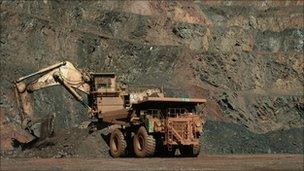Australia and India in interest rate rises
- Published

Australia's strong mining sector has boosted its economy
Australia and India have both raised interest rates by a quarter percentage point amid fears of rising inflation.
The central bank of Australia put up rates from 4.5% to 4.75%, surprising markets with the first rise since May.
India's rise, the sixth this year, was less unexpected. The Reserve Bank raised the repo rate, the rate at which it lends to banks, to 6.25% from 6%.
It raised the reverse repo rate - the rate at which it borrows from banks - to 5.25% from 5%.
The Reserve Bank of India's governor said in a statement that the likelihood of further increases in the near future was "relatively low".
Price rises
Australia was the only major developed economy to avoid recession during the global downturn.
It announced a series of rate increases between October 2009 and May 2010, designed to prevent the economy from overheating.
It has benefited from a boom in the mining and energy industries, supported by strong sales to China and India.
"It seems clear that the Reserve Bank is very worried about the potential impact of much higher export prices impacting on the Australian economy," Brian Redican, chief economist at Macquarie Bank in Sydney, told ҙуПуҙ«ГҪ World Service.
"Their confidence in that remaining strong has been heightened by some stronger data out of China recently," he said.
However, he added that raising interest rates was not a risk-free approach.
"It is clear that interest rates have already risen quite substantially over the last nine months in Australia and we have seen signs of a softening housing market.
"At the same time there has been a lot of government spending over the last 18 months. That's now beginning to wind back. So without that support there is a question mark about how strong the economic growth in Australia will actually be in 2011."
For its part, India has been facing rising food prices, as the soaring cost of staple goods such as grains, pulses, fruit and vegetables has caused economic as well as political tension.
Fuel costs have also been an issue for India, which imports about three-quarters of its oil.